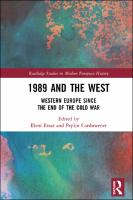1989 and the West
Proposal review
Western Europe since the End of the Cold War
Contributor(s)
Braat, Eleni (editor)
Corduwener, Pepijn (editor)
Language
EnglishAbstract
Back in 1989, many anticipated that the end of the Cold War would usher in the ‘end of history’ characterized by the victory of democracy and capitalism. At the thirtieth anniversary of this momentous event, this book challenges this assumption. It studies the most recent era of contemporary European history in order to analyse the impact, consequences and legacy of the end of the Cold War for Western Europe. Bringing together leading scholars on the topic, the volume answers the question of how the end of the Cold War has affected Western Europe and reveals how it accelerated and reinforced processes that shaped the fragile (geo-)political and economic order of the continent today. In four thematic sections, the book analyses the changing position of Germany in Europe; studies the transformation of neoliberal capitalism; answers the question how Western Europe faced the geopolitical challenges after the Berlin Wall came down; and investigates the crisis of representative democracy. As such, the book provides a comprehensive and novel historical perspective on Europe since the late 1980s.
Keywords
Central and Eastern Europe; Cold War; End of Communism; End of History; Fall of the Berlin Wall; Free Markets; Nationalism; Populism; Shock Therapy; 1989DOI
10.4324/9781315146355ISBN
9781351379939, 9781138505070, 9781315146355, 9780367487041, 9781351379939Publisher
Taylor & FrancisPublisher website
https://taylorandfrancis.com/Publication date and place
2020Grantor
Imprint
RoutledgeSeries
Routledge Studies in Modern European History,Classification
Humanities
European history
History of other lands
General & world history


 Download
Download